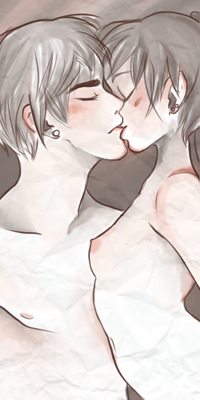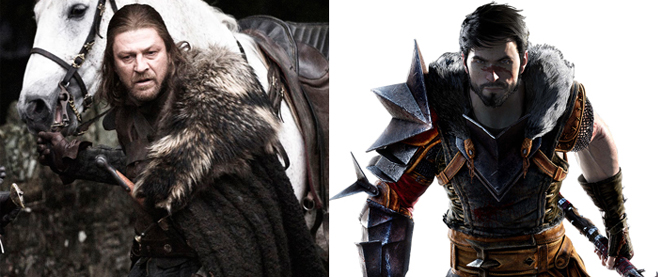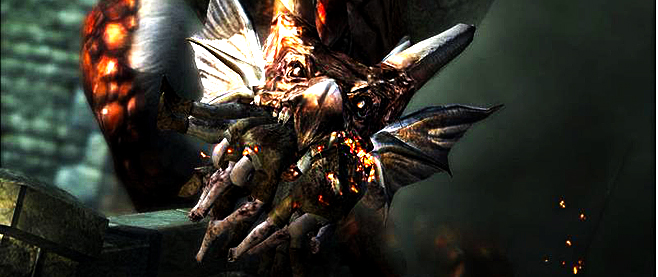
Don’t Take Love Personally, Babe: Being Single In Public
“Your only worth is your partner; it doesn’t matter what you do, it’s who are you with,” Christine Love tells me, matter-of-factly. I’m pretty certain at this point that I am the only person in the world who has ever Skyped a game developer I’ve never met to complain about my love life but, goddamn, if you’re going to do it, it better be Christine Love you call. Love by name, love by nature.
In Christine Love’s interactive novel Don’t Take It Personally, Babe, It Just Ain’t Your Story pretty much everyone is hooking up. You’ve got the narrator, John Rook, a hunky twice-divorced teacher who has such a boner-inducing crush on his student he can’t resist her; you’ve got two feuding lesbian kids who eventually make up adorably; you’ve got a guy who has just figured out he’s gay, has broken up with his girlfriend and has started bunking with the other cute gay guy in class. Hell, it seems like the only person who isn’t having it off with someone is one of the parents [insert joke about married life here]. “It’s very high school,” Christine explains, “Everyone is desperately trying to find someone.”
[pullquote]A hundred people in London are hooking up right-the-fuck-now…why aren’t I doing that?[/pullquote]
But really, do we ever really leave that state of mind?
Playing Don’t Take It Personally, Babe when you’re single, and have been for a while, is an alienating experience. It’s a wonderful shorthand of the messages that are going on around us every day. Couple culture is everywhere – it’s in every televisual soap or drama, it’s in every advertising campaign. Thanks to the efforts of political conservatives to limit it, marriage is in the news constantly. Spotify tells me now that I’m ‘a teenager,’ I should be getting advice on contraception – even little runt 16-year-olds are more likely to be in love with each other than I am with anyone. It seems like being someone’s other half is the most important thing in the world.
I can’t even escape on my commute to work – there it is in full color on the tube: an ad for Match.com about how a hundred people in London are hooking up right-the-fuck-now and why aren’t I doing that? I can’t even drink my latte without having to think about all the people who are having smug love-frenzied morning sex all over their dream flat they got together when they spotted it walking hand-in-hand down beside the motherfucking Thames. Shakespeare In Love. Bridget Jones. Sliding goddamn Doors.
Deep in the depths of Don’t Take It Personally, I’d get an occasional crisis: am I weird that a relationship hasn’t happened to me for this long? Friends would sit there and try and reassure me, “Hey man, you don’t need to have a boyfriend, it’s all cool – you know, you’re way cooler single!” And, you know what, I agree. I am a cooler person single. I love being able to choose what I do all weekend (sit in my underwear in bed playing point-and-clicks and watching Friday Night Lights). I love being able to choose what I wear (old t-shirts and dirty Chucks). I lo ve having the time to punish myself in the gym until eleven at night. I love not having to pay some gruff lady to wax my bikini line into a weird shape because I know I’m not going to get laid. I love bingeing on the West Wing until three in the morning – no one can stop me. I love not giving a shit about what anyone thinks about me. I love not having to go anywhere if I don’t want to. I love pining over Tim Riggins because I don’t have to placate a boyfriend that of course he could live up to that hot-as-all-hell abdominal set and cheekbones you could cut yourself on. “You know what, honey? You are goddamn cuter than even Tim goddamn Riggins!” (It’s not true, nor will it ever be true.)
ve having the time to punish myself in the gym until eleven at night. I love not having to pay some gruff lady to wax my bikini line into a weird shape because I know I’m not going to get laid. I love bingeing on the West Wing until three in the morning – no one can stop me. I love not giving a shit about what anyone thinks about me. I love not having to go anywhere if I don’t want to. I love pining over Tim Riggins because I don’t have to placate a boyfriend that of course he could live up to that hot-as-all-hell abdominal set and cheekbones you could cut yourself on. “You know what, honey? You are goddamn cuter than even Tim goddamn Riggins!” (It’s not true, nor will it ever be true.)
———
As cool as it is to be single, it still doesn’t ever feel like it is cool to be single. Like Rook in Don’t Take It Personally, I feel like I have failed at life, even though at 26 I am just bounding through ambitions like an excited puppy dog and I’m not supposed to need to do anything else with my love life except engage in casual sex with super-hot partners. And yet, I am forced to see everywhere the evidence of couples’ delirious pleasure at being in monogamous love. The primary way I know? It’s all over Facebook. Like a rash. It’s like being in high school. It’s like being in Don’t Take It Personally, Babe: whether gay, straight or bi, everyone is totally making out, dude: I was only away for a second!
“We live in a world totally dominated by social networking, you don’t really see romantic comedies that have really caught up with that,” Christine tells me. Don’t Take It Personally, Babe really exposes that domineering social pressure and how our ‘private’ lives are becoming more and more public. The burden, too, of knowing in Don’t Take It Personally, Babe is huge, particularly on John, as he can eavesdrop on his students and their love lives practically all the time through their social media posts. You don’t want to intrude, but that ever-present narrative is impossible to drag yourself away from. This knowledge is emphasized by the choice Christine forces us to make: does John feign ignorance of his students’ problems? Or does he admit he knows and then try to help? It’s like when a friend goes through a breakup on Facebook – do you give your condolences? Or do you try to pretend you didn’t notice so that they can retain some dignity? By taking the place of John Rook in DTIPB, you are identifying with his uncomfortable voyeurism.
The public merging with the private is terrifying for the single person, not least because even if you do traverse the dark waters of ‘hey, you’re hot, you should put that on here dudecakes’ (how I get my select choices of men) (I’m single) you have to have to worry about transitioning into something that isn’t single. In DTIPB, the trauma of coming out in our digital age is clearly drawn by Christine’s hand: Nolan’s uncertainty about his sexuality is under close scrutiny by everyone in school monitoring his relationship status updates. His breakup with Taylor and hookup with Akira is extremely public. Everything is arbitrated by gossip, social media, email, message boards. You might want to pay attention to the interesting observations John is making about the book the students read this week (Christine writes the dialogue impeccably well), but there’s always that little flashing button on the top right of the screen: click me, click me, click me let me tell you who I’m screwing now. Your mouse wanders over and obediently obliges. You are immediately immersed in the idle chat about ex-gf Taylor’s latest freakout at Nolan dating Akira.
scrutiny by everyone in school monitoring his relationship status updates. His breakup with Taylor and hookup with Akira is extremely public. Everything is arbitrated by gossip, social media, email, message boards. You might want to pay attention to the interesting observations John is making about the book the students read this week (Christine writes the dialogue impeccably well), but there’s always that little flashing button on the top right of the screen: click me, click me, click me let me tell you who I’m screwing now. Your mouse wanders over and obediently obliges. You are immediately immersed in the idle chat about ex-gf Taylor’s latest freakout at Nolan dating Akira.
Don’t Take It Personally, Babe illustrates the fact that social media has actually started to change the way we date. Christine Love’s student characters are so aware of their romances being immediately public, they only have brief, perfunctory conversations about changing their relationship statuses; they accept it as a given social function. I find that social pressure is revealed in terms of expectations upon us: because of the public nature of hookups now, and thanks to the ever-present online gossip-mongering and the all-seeing eye of the Facebook photo, if you are friends with someone and then are caught going home with each other, well, that’s it. You’re dating. You can’t just be about sex. Compulsory monogamy rears its ugly head once more. Everyone aims to be coupled up by 30. Ready? Steady? FLIRT WITH THE CUTE ONE!
———
Our focus on everyone being in that binary of relationship statuses, ‘single’ or ‘taken’, is damaging to our self-esteem, and can sometimes persuade us to stay in a bad relationship for longer, for fear of being thought of as a loner or a loser. “I am so sick of how much shit I have internalized, about how bad I should feel now that I am not in a happy loving relationship,” Christine says to me, when I confess my annoyance at feeling incomplete without a partner. “I set up this ridiculous expectation that I should be, and why?”
Christine’s sentiment summed up a conversation I had once with fellow games journalist Mattie Brice about our ‘unacceptable’ singledom. I recently asked Mattie if she thought there is a trend towards compulsory monogamy in our society. “Monogamy is less of a trend or choice and more of a ‘you better, or else’,” she said. “Everything in culture is prepping us for a heterosexual monogamy, or more accurately, serial monogamy. It’s a binary, where monogamy is the good choice and everything else is the lesser one. Being single is mostly seen as negative, because you either can’t find someone or have ‘issues.’ Polyamory is still taboo and seen as immoral. I have a huge problem with the valuing of heterosexual monogamy and the deprecation of every other kind of situation. I’ve never been in a relationship before, and it really knocks my self-esteem when I see others calling single gamers obvious losers for being inept at relationships.”
Our fixation on compulsory heterosexual monogamy in rom-coms and mainstream narrative culture also marginalizes further those already marginalized by society. Mattie’s transgender experiences inform her negative view of monogamy as a goal in general: “For my own experience, being transgender is an automatic red X; no matter how appealing I might be on paper, once a person sees I’m transgender, all bets are off. This is supported by the lack of trans people in relationships in our movies and books, the cultural defamation of trans people, and the general lack of awareness on trans issues. Along with that, I  can’t get married wherever I want in my country because of discriminatory laws, and even if I did, I wouldn’t get federal benefits. My alternatives involve non-monogamy, so as you can see, there’s no winning no matter what choice I make. This isn’t based on any choices I made; I’m treated this way just because I exist.” Just because Mattie doesn’t fit in with the cookie-cutter way relationships are traditionally conducted, she feels as though she is somehow failing when there is no real way she can ‘win’ this game – it is rigged.
can’t get married wherever I want in my country because of discriminatory laws, and even if I did, I wouldn’t get federal benefits. My alternatives involve non-monogamy, so as you can see, there’s no winning no matter what choice I make. This isn’t based on any choices I made; I’m treated this way just because I exist.” Just because Mattie doesn’t fit in with the cookie-cutter way relationships are traditionally conducted, she feels as though she is somehow failing when there is no real way she can ‘win’ this game – it is rigged.
I don’t want games to tell me that a relationship or marriage is one of the ultimate goals in life; and yet the frameworks for compulsory monogamy pop up often in games. Placing an emphasis on ‘achieving’ a relationship in games puts undue pressure on players who are already acutely aware of tropes such as the ‘virgin nerd’ stereotype. Bioware’s Dragon Age: Origins even acknowledge this particular stereotype by having the super-hunky-sexy-paladin-man Alistair confess his virginity in a nice move to smash the idea that male sexual experience is desirable. (As a side note, I failed to seduce Alistair, though I tried SO hard. I think I gave him pretty much every gift I had.) (Single.) Where DTIPB differs from games such as Dragon Age is that the relationships are happening around you anyway. In this way, Love’s game is a positive step forward – as Mattie puts it, “Don’t Take it Personally, Babe provides an alternative where the player isn’t required to bring meaning to a relationship, but can still interact and learn from it.” In other words, there is very little pressure to ‘achieve’ a relationship; they just happen naturally. Love’s game becomes an example of organic relationships.
———
Though I have all these legitimate criticisms of the Japanese rom-com utopia Christine Love has mimicked, I do want to be in love like that. I’ve gone through that honeymoon period in newfound singledom where I participated in that fevered joy that is the suddenly-single all-you-can-sex buffet. I can’t really do it any more. I sometimes get really hurt doing it, and hurt other people. All I do now is remember when I had someone I loved to fall asleep on; a heartbeat thumping into my ears like that Nevada level of Tomb Raider III. I resent the compulsory coupledom that surrounds me practically everywhere I go because I remember a little too vividly how comfortable and wonderful it is. It irks me: it makes me susceptible.
For me, Don’t Take It Personally, Babe is about people who live in the narrative that others have constructed around relationships – those Japanese mangas, TV dramas, rom-com films and animes. Like Rook, I struggle to get out of that narrative, and, like him, I will never escape it. Ultimately, it seems, neither will Christine. “[Modern life] involves trying to figure out when the appropriate time to update your relationship status on Facebook is,” she says. “…I’m still figuring that out, by the way.” Love on love.
———
Cara’s on Twitter where you can ask her out at @CaraEllison (Single.) Many thanks to the awesome @xMattieBrice for her counsel, and of course to the best agony aunt a girl could have: @ChristineLove. Illustrations by Amber Harris. Tim Riggins by Tim Riggins.





